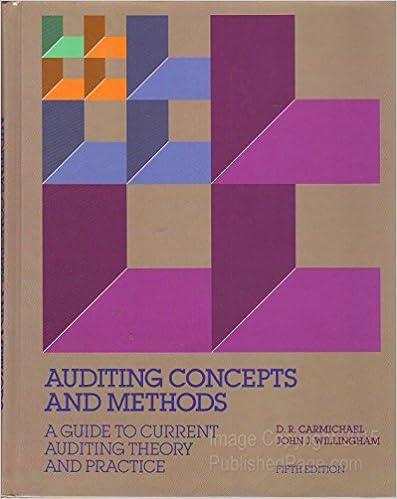On February 24, 19X9 you completed field work for the audit of the financial statements of Goldman
Question:
On February 24, 19X9 you completed field work for the audit of the financial statements of Goldman Enterprises for the year ended December 31, 19X8. Goldman Enterprises is headed by P.B. Goldman, an aggressive, young entrepreneur who in January 19X8 replaced his father as chief executive officer by pressuring the board of directors to demand the senior Goldman's resignation. P.B. Goldman immediately announced plans to expand the organization through an intensive program of modernization and acquisitions. P.B. Goldman hired M. Foxmire as financial vice-president and gave Foxmire primary responsibility for negotiating acquisitions and a special assignment to streamline the accounting system. Foxmire was hired in midyear and quickly revamped the billing, collection, and payment routines and then began traveling extensively to identify potential acquisition candidates. You have had a final conference with the client. The financial statements and audit report for Goldman Enterprises are being typed, collated, and reproduced in your report department when, on February 28, 19X9, you are surprised to read in the financial section of the local newspaper a feature story on Goldman Enterprises. Several matters arouse your interest. Goldman Enterprises has settled litigation with the senior Mr. Goldman. He had charged various improprieties in his ejection from the company and sought a much larger amount than he had been given in severance pay and consultant's fees. The financial statements as of December 31, 19X8, disclose the litigation and contained an allowance for separation compensation of \($50,000.\) The settlement agreement awards the senior Mr. Goldman \($300,000,\) an amount material to the financial statements. A call to P.B. Goldman confirms the terms of the settlement. P.B. Goldman explains having had some misgivings about the treatment of his father and persuaded the board to authorize the new agreement. P.B. Goldman agrees to send over the written agreement and the minutes of the emergency board meeting at which it was approved on February 26, 19X9. The story also reports the purchase on February 26, 19X9, of Silverson, a business that manufactures a product similar to Goldman Enterprises' largest line, but with mail order distribution to consumers. Goldman Enterprises sells to retailers and distributes through various common carriers. Silverson Inc. has manufacturing facilities approximately the same in size as Goldman Enterprises. In your phone conversation, P.B. Goldman is enthusiastic about the acquisition and explains that production capacity has been doubled and significant new chan- nels of distribution are available. P.B. Goldman is glad you called because you are to undertake an acquisition investigation of Silverson. The board approved the purchase at the February 26, 19X9 meeting, but the purchase price will be deter- mined by an agreed-upon formula based on amounts in Silverson's audited financial statements. The audit will not be completed until around the end of March, but unaudited financial statements are available now.
At the end of March, you are at Goldman Enterprises to explain your report on the acquisition investigation. You stop in the cafeteria for a quick breakfast before your appearance at the board meeting. As you are eating and reviewing your report, you overhear two maintenance men talking at the next table: "That Foxmire really messed things up. Last night, I was cleaning up an old storage room and found twelve cartons of invoices nobody knew about. The assistant controller said there must be at least \($600,000\) in last year's expenses that weren't recorded." Suddenly, you are not very hungry.
1. How should the events approved at the February 26, 19X9 board meeting be reflected in the financial statements and covered in your audit report, assuming that the report is issued by March 2, 19X99 Explain the reasons for your choice of coverage.
2. What are your responsibilities with respect to the information overheard in the cafeteria? Explain how you should proceed.
3. How would you evaluate your understanding of this client?
4. What audit procedures should have spared you from being surprised when reading the financial papers and losing your appetite at breakfast?
Step by Step Answer:

Auditing Concepts And Methods A Guide To Current Auditing Theory And Practice
ISBN: 9780070099999
5th Edition
Authors: Mcgraw-Hill





